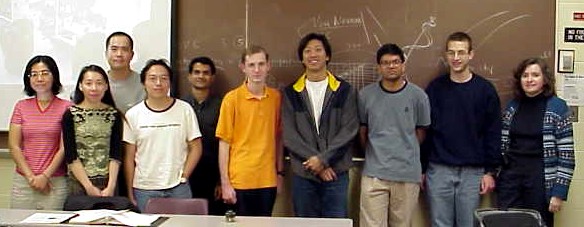Fall 2002, MCS 5503 Intelligent Systems
Tuesday 5:45-8:25pm
Syllabus

car 4 sale by my student
Class Competition (EANN and TSP) Winner: David Chamulak,
Results
Instructor: Chan-Jin Chung, Ph. D. (Personal webpage: www3.ltu.edu/~chung)
Course Description
Philosophers have been trying to understand and resolve two big questions of the universe: how does a human mind work,
and can non-human have minds? However, these questions are still unanswered.
This course will be fun because we try to explore the above interesting questions by using
computer science technologies.
This course introduces methods and techniques to build systems with computational intelligence. Class topics includes:
fundamental issues in Intelligent Systems and Artificial Intelligence, search and optimization methods,
representing knowledge and reasoning methods, introduction to Artificial Neural Nets, introduction to
Evolutionary Computation, introduction to Fuzzy Logic Control, and introduction to autonomous robotics
and robot cooperation.
Students will gain practical experience by applying those concepts learned to the development of practical
intelligent systems such as intelligent web applications, intelligent web services, design optimization, data mining,
timetabling systems, bioinformatics (symbol sequence recognizer), pervasive computing,
robot simulator, and automomous mobile robots (Lego, Khepera, and laptopBot).
Prerequisites: Knowledge of data structures and (C++ or Java)
Class Projects and Some Homeworks
ES Source Codes and Data Files
Teaching Philosophies
- Knowledge is only part of understanding. Genuine understanding comes from hands on experience.
The best way to learn is by doing. (Dr. S. Papert, MIT Robotics Lab)
The only way not to succeed is not to try. (Edward Teller) I am always motivating students to do in
various ways such as developing real-world projects, publishing research papers, and participating
in various public demonstrations and competitions.
- In theory, there is no difference between theory and practice; But in practice, there is. In my classes,
I am always trying to put theory into practice.
- Education is not the filling of the vessel. It is the lighting of the flame. (Dr. Reid) I try
to motivate students.
- Lectures ought to be short enough to be interesting, but long enough to cover the essentials.
- In many cases, we learn easily by examples.
Many real-world examples, which are brief, will be introduced in class.
Students who can benefit from this course are:
- Masters of Science in Computer Science students who are looking for two major concentrations for satisfying
the degree requirements. The next course would be MCS 6513 Advanced Topics in Intelligent Systems in Spring 2003.
- Masters of Science in Electrical and Computer Engineering students can take this as a technical elective course
(you need to complete at least 30 credits).
- Students who want to publish research papers in various international research conferences, for example,
GECCO-2003 in Chicago, July 12-16, 2003.
- Students who want to participate in robotics competitions and/or various research competitions.
- Students who are interested in creating own high-tech company for the new millennium.
- Undergrad students who need elective classes and consider applying for graduate program at LTU or
other Universities.

